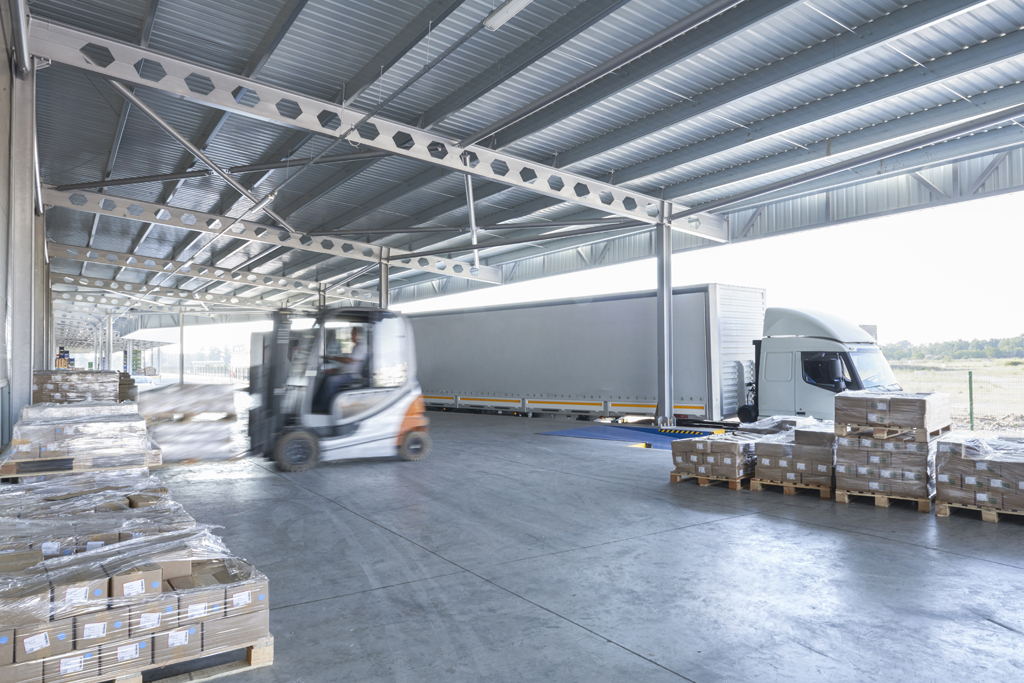It’s a sound you don’t want to hear: You have just started a trip and you apply the brakes or round a corner and a thud or the cracking of wood tells you that the cargo in the back of your dry van trailer or refrigerated trailer has shifted and something has been damaged. You pull over, open the cargo door and discover that you have some clean-up work to do and will be having an uncomfortable conversation about the cost of whatever has been destroyed.

And the worst thing about this scenario is that you easily could have prevented it. Proper cargo securement takes a little time, but any load can be secured properly with some forethought and effort. Compared to the cost of damaged goods, the investment you make in learning and using the proper techniques in your dry van trailer or reefer trailer is well worth it.
8 Things to Keep in Mind When Securing Loads in Semi Trailers
When securing loads in a dry van trailer or reefer trailer—or in any semi trailer, for that matter—it is important to go through a mental checklist of important considerations. Specifically, you should:
- Know your cargo. Loading up quickly and getting back on the road without learning about the cargo you are carrying greatly increases your risk of damaging those goods. What’s in the crates? Can that large, uncrated item slide or roll? How much does it weigh? Does it have a low or high center of gravity? Answers to these and other related questions help you devise your securement strategy.
- Know your restraints. The straps you use to secure cargo have ratings. For example, they may have been tested and rated capable of securing 5,000 pounds. If an item you are strapping weighs 7,500 pounds, that tells you additional measures will be needed to successfully keep the item stationary during your trip.
- Inspect your restraints. A badly frayed cargo strap will not provide the level of protection it is intended to provide. And, just as importantly, if you don’t see that it is frayed, it may give you a false sense of security that quickly evaporates when the strap snaps and your cargo is “free to move about” the trailer! You should give your straps a visual and physical inspection before each use. Even the best-made restraints will wear out eventually and need to be replaced, and you have to make that determination before an accident occurs.
- Distribute cargo evenly. Heavy items that are too close to the front or back of your semi trailer, significantly left or right of center, or stacked too high already have a “head start” if unexpected shifting occurs. A balanced load does a better job of resisting the forces that are attempting to dislodge it.
- Block and brace appropriately. Proper strapping may be able to hold some types of loads in place. But in many cases, blocking and bracing can, and should, be used to add extra stability, and may be required to fully secure your cargo.
- Account for every gap around your cargo. If there is empty space in your dry van trailer or reefer trailer, your cargo will attempt to move into it. That is just physics. As you observe those gaps, think about what is—or can be—preventing the load from moving there. Straps are important, of course, However, you can also fill gaps, like those between a load and the side walls of the trailer, with an appropriately strong filler item. You may also be able to position your load so that there are few gaps or none at all.
- Beware the outliers. When securing groups of products or containers, you should pay special attention to those that stick out. For instance, if you are carrying a load of heavy lumber planks and one is longer than the others, it may not be getting sufficient pressure from your straps. If that is the case, it will be the first item to come free when you brake or turn, and you should take extra precautions with it.
- Don’t overestimate the strength of your semi trailer. There can be a tendency, especially with new drivers or drivers hauling a dry van trailer or reefer trailer for the time, to believe that the trailer will keep cargo contained even if it comes loose. While today’s semi trailers are very strong, there is no guarantee that their walls will not be breached by a poorly secured item that gets free and becomes a “projectile” during a hard braking or turning maneuver. It is better to think of a semi trailer’s walls as being made of tissue paper and securing loads accordingly.
Get Familiar With Your Rental Semi Trailer
The tips above are important with any semi trailer you use. If you are renting or leasing a dry van trailer or reefer trailer, they are even more critical. With a trailer that you own, you know all the “tricks” to securing cargo. A rental semi trailer may have different characteristics and therefore require a modified securement strategy.
Where are the anchor points? How rough or smooth is the flooring and how will that affect the stabilizing friction it produces? And beyond its internal features, how does the trailer handle? These are the types of questions you should ask yourself when you first pick up your rented semi trailer. A busy loading crew, and your customer, will be glad you did.
Is Your Cargo Still Secure?
Properly securing your cargo before you depart is just the first step toward arriving safely at your destination. The forces your rig encounters on the road immediately begin working on your load and attempting to overcome your securement strategy.
Especially on longer trips, it is crucial that you periodically inspect your cargo and the straps and other devices holding it in place. Here again, it takes a little time and effort, but it is time and effort well spent if you discover an issue before it becomes a problem. Replacing a strap that has suffered some damage or repositioning part of your load now that you see what its tendency to shift helps ensure that you can complete your trip without incident.
To learn more about Boxwheel and our inventory of rental dry van trailers and refrigerated trailers, as well as our flatbeds and liftgates, please contact us at your convenience.
About Boxwheel Trailer Leasing
Boxwheel Trailer Leasing was founded on the idea that leasing semi trailers doesn’t have to be complicated. Leveraging decades of experience in trailer leasing and sales, our team of industry veterans has eliminated the red tape and mountains of paperwork to make getting on the road with a leased, rented or purchased trailer easy, affordable, and safe. https://boxwheel.com
Boxwheel Trailer Leasing
Media Contact
Mike Di Paolo | Co-Owner
(720) 527-2992







